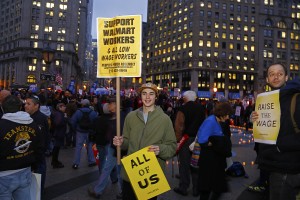The Seattle city council overwhelmingly voted in favor of passing an ordinance that would raise the minimum wage to $15 over a period of several years. The measure would commence Apr. 1, 2015 and the phasing in would be different for four different groups. The issue has dominated local politics since Mayor Ed Murray and socialist City Councillor Kshama Sawant arrived on the scene.
According to the plan, businesses with more than 500 employees across the country would have at least three years to phase in the substantial wage increase. Companies that offer health insurance will have four years to institute a higher wage, while smaller firms will be provided with seven years.
 The final vote came after more than four months when an advisory group of non-profit organizations, labor and business groups made recommendations to the Seattle mayor. Last week, the city council had delayed implementation and instead supported a sub-minimum wage for teenagers, which was opposed by labor organizations.
The final vote came after more than four months when an advisory group of non-profit organizations, labor and business groups made recommendations to the Seattle mayor. Last week, the city council had delayed implementation and instead supported a sub-minimum wage for teenagers, which was opposed by labor organizations.
“This legislation sends a message heard around the world: Seattle wants to stop the race to the bottom in wages and that we deplore the growth in income inequality and the widening gap between the rich and the poor,” Councilmember Tom Rasmussen said.
Sawant, who has railed against capitalism, free markets and business – though her husband is employed by Microsoft as an engineer – stated that the city is setting a precedent for the rest of the country.
“Seattle will be the place with the highest minimum wage in the country. But how will we expect workers in other cities to fight big business if we don’t set the right tone?” Sawant said in a statement.
Opponents of the measure, particularly restaurant owners, who have small profit margins, say this mandated wage will force them to nix expansion plans, reduce their workforce and slash hours. In April, a group of small business owners issued a letter to Mayor Murray and warned that those who rely on minimum wage jobs and are most vulnerable in society, such as immigrants, the uneducated and unskilled, will be hurt the most.
“The financial cost to our businesses will be staggering, considering our low profit margins and the proposed 40 percent increase in wages — without factoring payroll taxes and compensations,” the letter stated. “Large portions of our staffs are immigrant workers. These are people who come to this country with very little skill or English proficiency. They arrive at our various businesses seeking jobs because we provide a landing zone for them to get their foot in the door and learn valuable skills.”
Economists who stand against a minimum wage and call for its abolishment present the case that this anti-poverty measure actually creates poverty and eliminates jobs for the very people the government is attempting to help. They also say that businesses will likely enhance their automation efforts, increase their qualification needs and the poor will be forced to pay higher prices in the marketplace.
San Francisco currently maintains the highest minimum wage in the United States with $10.74. Washington State, meanwhile, currently maintains a minimum wage of $9.32. President Barack Obama has called for a federal minimum wage increase of $10.10.



